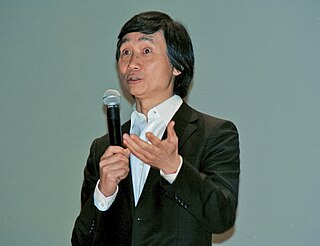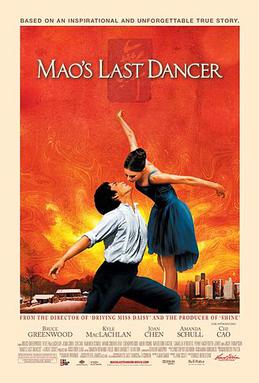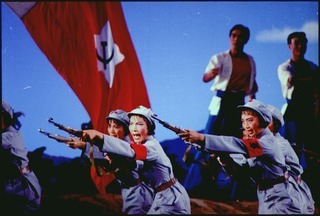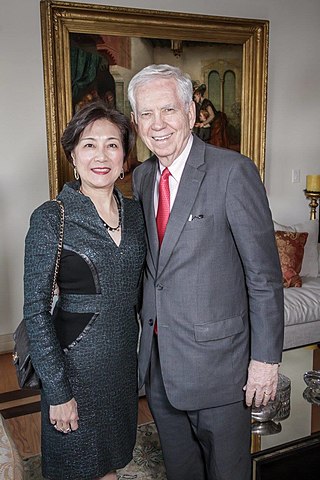
Jiang Qing, also known as Madame Mao, was a Chinese communist revolutionary, actress, and major political figure during the Cultural Revolution (1966–1976). She was the fourth wife of Mao Zedong, the Chairman of the Communist Party and Paramount leader of China. She used the stage name Lan Ping (藍蘋) during her acting career, and was known by many other names. Jiang was best known for playing a major role in the Cultural Revolution and for forming the radical political alliance known as the Gang of Four.
Some films feature recognizable dance forms, demonstrating them, shedding light on their origin, or being the base of a plot.

The White-Haired Girl is a Chinese contemporary classical opera by Yan Jinxuan to a Chinese libretto by He Jingzhi and Ding Yi. It was later adapted to a ballet, a Peking opera, and a film. The ballet adaptation was regarded as a revolutionary opera.

Amanda Schull is an American actress and former professional ballet dancer. She is known for her lead role in the 2000 film Center Stage, and for her recurring roles on the American television series One Tree Hill and Pretty Little Liars. She starred as Dr. Cassandra Railly in the Syfy television series 12 Monkeys, and played a recurring role on the USA Network television series Suits before being promoted to series regular for the show's eighth and ninth seasons.
Houston Ballet, operated by Houston Ballet Foundation, is a professional ballet company based in Houston, Texas. The company consists of 59 dancers and produces over 85 performances per year. It is the 5th largest ballet company in the United States.

The Beijing Dance Academy is a municipal public professional dance college at Haidian, Beijing. The academy is the highest institution for dance education and assessment in the People's Republic of China, conducting the nationwide teacher qualification level examinations in Chinese dance.

Li Cunxin is a Chinese-Australian former ballet dancer turned stockbroker. He was the artistic director of the Queensland Ballet between 2012 and 2023.
The USA International Ballet Competition, or USA IBC, is one of the world's top competitions for ballet. Located in Jackson, Mississippi, this competition is attended by dancers from all over the world to represent their country for bronze, silver, or gold medals in a variety of categories of ballet in an Olympic-style competition.

Queensland Ballet, founded in 1960 by Charles Lisner, is the premier ballet company of Queensland, Australia, and is based in Brisbane. It is one of only three full-time, professional classical ballet companies in Australia. The company has had six previous Artistic Directors, and is currently led by Leanne Benjamin.
Ben Stevenson OBE, is a former ballet dancer with Britain's Royal Ballet and English National Ballet, co-director of National Ballet of Washington, D.C. (1971–1974), artistic director of Chicago Ballet (1974-1975), artistic director of Houston Ballet (1976–2003), and artistic director of Texas Ballet Theater (2003–2022).

Leanne Faye Benjamin is a retired Australian ballet dancer who was a principal dancer with the Royal Ballet in London. She was appointed artistic director at the Queensland Ballet in 2024. She stepped down from the position on 2 August 2024.
Chi Cao is a British ballet dancer born in China.
Greg Horsman is an Australian ballet choreographer, teacher, and retired dancer. In 2022, Dance Magazine Australia described him as "formerly one of the Australian Ballet's most poetic and classical of principal artists." He and his then-wife Lisa Pavane were a popular partnership during the 1980s and early 1990s, with the Washington Post referring to their "conspicuously poised, elegant dancing" and the New York Times calling them "two perfectly trained and appealing first-class dancers" during a performance of Giselle. Horsman was appointed Acting Artistic Director Queensland Ballet in July 2024. Horsman has been Assistant Artistic Director Queensland Ballet since 2023 and was previously the Chief Ballet Master and Director of Artistic Operations for the Queensland Ballet since 2013.
Jan Vittorio Sardi is an Australian screenwriter. In 1997, he was nominated for an Academy Award for Best Writing, for Shine. He wrote and directed the 2004 film Love's Brother. He adapted the novel by Nicholas Sparks for The Notebook (2004). Sardi also adapted Li Cunxin's memoir for the film Mao's Last Dancer (2009) and the miniseries The Secret River, based on the novel by Kate Grenville.

Mao's Last Dancer is a 2009 Australian film based on professional dancer Li Cunxin's 2003 autobiographical memoir of the same name. Li Cunxin is portrayed by Birmingham Royal Ballet Principal Dancer Chi Cao, Australian Ballet dancer Chengwu Guo and Huang Wen Bin. The film also stars Bruce Greenwood, Kyle MacLachlan, Joan Chen and Amanda Schull.

The National Ballet of China (NBC), known in China as the Central Ballet Troupe was founded on 31 December 1959. It is the national ballet company of the People's Republic of China.
Guo Chengwu, also known as Chengwu Guo, is a Chinese ballet dancer, and a principal artist with The Australian Ballet.
Madeleine Eastoe is an Australian retired ballet dancer. She was a principal dancer at The Australian Ballet.

Charles C. Foster is an American immigration attorney and chairman of the Houston-based law firm Foster LLP. Foster has earned top awards from organizations including Chambers and Partners, Texas Monthly magazine, and the American Immigration Law Foundation. He also serves as the honorary consul general of the Kingdom of Thailand in Houston and has received four royal decorations from His Majesty, King Bhumibol Adulyadej of Thailand.

Deng Zihui was a Chinese communist revolutionary and one of the most influential leaders of the People's Republic of China during the 1940s and 1950s. He was one of the major military leaders of China during the Chinese Civil War along with Mao Zedong, Zhou Enlai, Peng Dehuai and Lin Biao.











